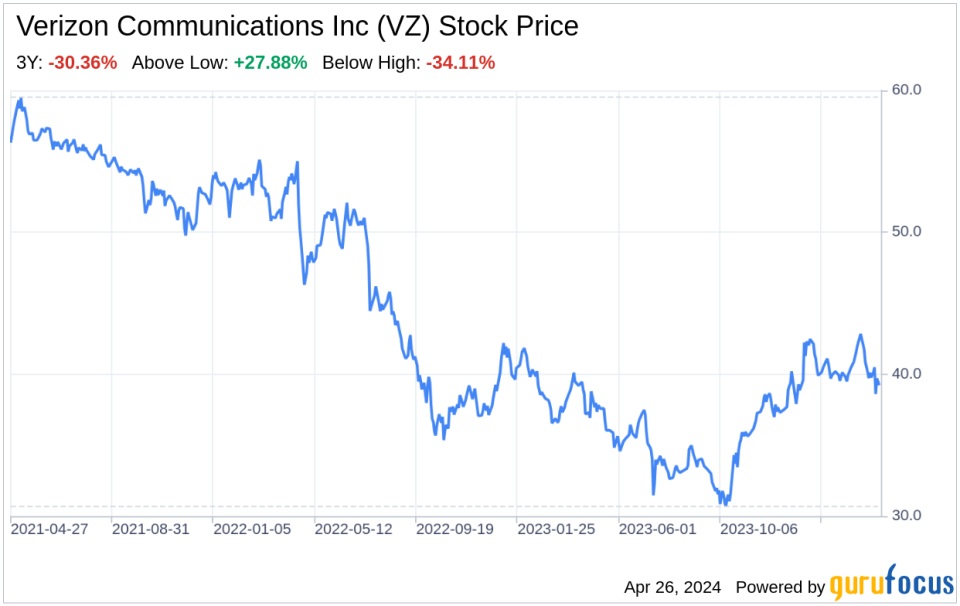Decoding Verizon Communications Inc (VZ): A Strategic SWOT Insight
Verizon's expansive wireless network and brand strength remain key assets.
Challenges in wireless equipment revenue signal a need for strategic adjustments.
Opportunities in 5G and fiber infrastructure investment could propel future growth.
Market pressures and competitive threats persist in the dynamic telecom landscape.
On April 25, 2024, Verizon Communications Inc (NYSE:VZ) released its 10-Q filing, offering a detailed glimpse into its financial performance and strategic positioning. As the largest U.S. wireless carrier, Verizon reported a slight increase in operating revenues to $32,981 million in the first quarter of 2024, compared to $32,912 million in the same period last year. Despite this, net income saw a decrease from $5,018 million to $4,722 million year-over-year. The company's financial health remains robust, with a diverse portfolio of wireless and fixed-line telecom operations. This SWOT analysis delves into the strengths, weaknesses, opportunities, and threats as revealed by the latest SEC filings and market dynamics.

Strengths
Extensive Wireless Network and Brand Reputation: Verizon's wireless network is a formidable asset, covering approximately 93 million postpaid and 21 million prepaid customers. The brand is synonymous with network reliability and quality, a reputation that has been cultivated over years of investment in infrastructure and technology. The company's focus on high-performing 4G and 5G networks underpins its competitive advantage, as evidenced by its commitment to deploying new network architecture and technologies. This strength is not only a testament to Verizon's current market position but also a foundation for future growth and innovation.
Financial Resilience and Diverse Revenue Streams: Verizon's financial resilience is evident in its strong balance sheet and diverse revenue streams. The company's service revenues and other income have remained relatively stable, with a slight increase from $27,152 million to $27,620 million in the first quarter of 2024. This stability is crucial in a volatile market and provides Verizon with the flexibility to navigate economic fluctuations. Additionally, the company's fixed-line telecom operations and enterprise services contribute to a diversified portfolio that mitigates risks associated with reliance on a single revenue source.
Weaknesses
Decline in Wireless Equipment Revenue: A notable weakness in Verizon's recent performance is the decline in wireless equipment revenue, which dropped from $5,760 million to $5,361 million year-over-year. This decrease is primarily due to a 21% reduction in upgrades, indicating potential saturation in the market or a shift in consumer behavior. This trend could signal a need for Verizon to reassess its equipment sales strategy and explore new avenues for revenue generation in this segment.
Operational Costs and Market Pressures: Verizon faces increasing operational costs, particularly in the deployment of C-Band spectrum and associated rent and lease expenses. The company's cost of services has seen a slight uptick, which could impact margins if not managed effectively. Additionally, the telecom industry is subject to intense market pressures, including price competition and technological advancements that require constant investment. These factors necessitate vigilant cost management and strategic planning to maintain profitability.
Opportunities
5G Network Expansion and Monetization: The rollout of 5G technology presents significant opportunities for Verizon. With its industry-leading spectrum holdings, Verizon is well-positioned to capitalize on the demand for faster and more reliable wireless services. The company's investment in 5G infrastructure, including the acquisition of C-Band spectrum, is a strategic move to drive innovative products and services. This expansion offers the potential for new revenue streams through enhanced mobile and fixed wireless solutions, catering to the evolving needs of consumers and businesses alike.
Growth in Fiber and IoT Solutions: Verizon's investment in high-speed fiber and Internet of Things (IoT) solutions opens up new avenues for growth. The company's fiber infrastructure supports its wireless network and provides a platform for delivering advanced services, such as FWA broadband and IoT applications. As the demand for connected devices and smart solutions continues to rise, Verizon's capabilities in these areas could lead to increased market share and customer loyalty.
Threats
Competitive Landscape and Market Saturation: The telecom industry is fiercely competitive, with major players constantly vying for market share. Verizon must contend with aggressive pricing strategies and innovative offerings from competitors, which could erode its customer base and revenue. Additionally, the U.S. wireless market is nearing saturation, making customer acquisition and retention more challenging. Verizon must continue to differentiate itself through superior service quality and value-added offerings to maintain its leadership position.
Regulatory and Legal Challenges: Verizon operates in a highly regulated environment, which can lead to significant legal and compliance costs. The company is currently involved in various litigation and regulatory proceedings, which, while not expected to materially affect its financial condition, could impact its operations and reputation. Moreover, changes in regulatory policies or unfavorable outcomes in legal matters could pose additional risks to the company's strategic objectives and financial performance.
In conclusion, Verizon Communications Inc (NYSE:VZ) exhibits a robust set of strengths, including its extensive wireless network and brand reputation, which provide a solid foundation for continued success. However, challenges such as the decline in wireless equipment revenue and increasing operational costs must be addressed to sustain growth. Opportunities in 5G expansion and fiber investments are promising, but the company must navigate a competitive landscape and regulatory hurdles. By leveraging its strengths and addressing its weaknesses, Verizon can capitalize on emerging opportunities while mitigating threats in the dynamic telecom industry.
This article, generated by GuruFocus, is designed to provide general insights and is not tailored financial advice. Our commentary is rooted in historical data and analyst projections, utilizing an impartial methodology, and is not intended to serve as specific investment guidance. It does not formulate a recommendation to purchase or divest any stock and does not consider individual investment objectives or financial circumstances. Our objective is to deliver long-term, fundamental data-driven analysis. Be aware that our analysis might not incorporate the most recent, price-sensitive company announcements or qualitative information. GuruFocus holds no position in the stocks mentioned herein.
This article first appeared on GuruFocus.

 Yahoo Finance
Yahoo Finance 